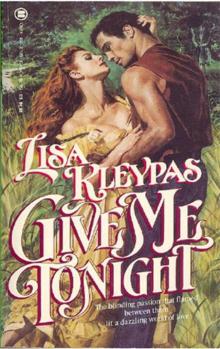- Home
- Lisa Kleypas
Wish List Page 13
Wish List Read online
Page 13
“You never answered my question last night.”
“Which was that?”
“I asked if you had advice for me for hunting a husband during the season,” she said, hoping it did not sound as if she were asking advice for hunting him—although that actually was what she was doing. Not that she could use whatever information he gave her; it would be too transparent. Oh, heavens, why had she said anything at all?
“That all depends upon which sort you wish to catch. You must dangle the proper bait for the beast.”
“I have only one very poor bit of bait to dangle, and it rules out fortune hunters and social climbers.”
“That is a shame. Many a young lady has made her match with such,” he said. “London is full of them.”
“I was rather counting on an elderly gentleman with a comfortable income.”
“Simply because they are aged does not mean they are any less likely to want an heiress,” Mr. Brent said. “Their greed does not slow with their limbs.”
“Dear me. How about impetuous youths who have already inherited, and so cannot be disowned for making a bad match?”
“Those are difficult to catch, and make poor husbands, being prone to drink and gambling. Like as not you will end up living on credit, and soon enough be bankrupt.”
“There is no point in returning from whence I started,” she said.
Mr. Brent seemed to be enjoying this vein of conversation. She was almost enjoying it herself. He dared her to say the thoughts that she would normally not utter even to herself. She had spent her life speaking only those words that would please her benefactors, pretending to be much nicer than she knew herself to be, hiding her darkest, most selfish and discontented thoughts for fear they would show on her face and betray her as a woman unworthy of even grudging charity.
“An exceedingly ugly man might prove acceptable,” she proposed. “I think I could grow to love him, if he had a sweet temper.”
“He will either be so vain as to think himself worthy of a better match, or so shy he will never manage to offer.”
“A sick man, then, who needs an heir before he dies?”
“The competition will be fierce. What young lady would not like to be a wealthy widow, free to do as she pleased?”
“That is a harsh view to take,” Vivian argued. “I do not believe that one in a thousand young ladies would be so calculating.”
“You said yourself you would be willing.”
“For the sake of having a husband, not for being his widow. Really, Mr. Brent, you have a jaded view of womankind.”
“Not as jaded as I could wish,” he said. The next moment dinner was announced, interrupting their conversation and leaving her to wonder what he could possibly mean by such a statement.
—
The dinner table was too small, the company too cozy and close to engage in suggestive banter. Vivian was seated next to Captain Twitchen, Mr. Brent across from her. The family spoke of relations not present or long dead, dredging up memories in which she could not share.
She kept a vacant smile on her lips and concentrated on dinner.
Mr. Brent caught her eye several times, looking with a questioning brow at her plate, then at the dishes arrayed around the table. She had only to let her gaze linger upon some platter beyond her reach, and he would move it nearer to her. If the captain was engrossed in telling a tale and did not notice she was waiting to be served yet again, Mr. Brent dared her with his eyes to serve herself.
So she did. There were two removes between main courses, and she was almost feeling full by the time dessert was finished and Lady Sudley signaled the ladies’ retreat to the drawing room.
The tea had been poured and distributed, and Penelope had gone to the pianoforte to stumble through some of the sheet music there, when two nursemaids appeared in the doorway, white-gowned toddlers and young children around their knees.
“My lady, the children wished to say good night,” one of the maids said, as the plump creatures spilled into the room. One went for the spaniel that had been curled harmlessly by the fire; one waddled to Lady Sudley; another sprang to the table where the tea things stood, his small hands reaching up to play with the sugar dish and creamer; and the last wobbled to the pianoforte and added his own notes to Penelope’s soon-halted playing.
The spaniel cast a long-suffering look to the adults in the room, then slunk off to hide beneath a divan. Deprived of her target, the little girl of about four years went to join the younger boy at the tea tray.
“She looks more like you every day,” Mrs. Twitchen said, nodding toward another girl, who had crawled into Lady Sudley’s lap.
“She has her father’s sense of mischief, though. Don’t you, my naughty pumpkin?”
“Nooo,” the girl protested, wrapping her arms around her mother’s neck.
Vivian blinked at the four children, trying to match their ages with the length of Lady Sudley’s marriage, wondering how she could have produced so many so quickly.
An altercation arose at the tea tray. The boy—not more than two, surely—had a spoon in his fist, and the girl was trying to take it away. The girl wrenched it from his hand, and the boy wailed, then went with flying fists at his sibling.
“William! Sara!” came a harsh male voice from behind Vivian. “Stop it at once!”
“My ‘poon! Mine!” William wailed, striking his sister again.
Sara shoved the boy, and he fell onto his round backside. It was not a long distance to fall, but the indignity of it overtook him, and he threw himself face-first to the carpet and howled.
“Sara! What did I tell you?” Mr. Brent said, stepping into the fray. “Give me the spoon.”
“But, Papa!”
“At once!”
Sara held tight to it a moment longer, then with a pout handed it over.
“Now apologize to your brother.”
Sara knelt down beside the still-howling William and patted his back. “‘S’all right, Willie. I’m sorry.”
William took a breath and gave a howl of a higher pitch. Sara bent over and looked at her brother face-to-face. He turned to the other side. She followed and put her hands over her eyes.
“Who’s that?” she said, taking them away from her face.
William’s howls stopped. Sara covered her eyes again.
“Who’s that? Is that Willie?” she asked, revealing herself again.
“‘S Sara,” he said.
Vivian watched wide-eyed as Mr. Brent picked William up from the floor, holding him against his side, over his hip, with the ease of long practice. William flopped against his father with his arms straight at his sides, his still-red face looking down at his sister with an unreadable expression.
“You’re overtired, the both of you,” Mr. Brent said, then kissed William on the temple and handed him to one of the nursemaids. Sara had her arms raised and waiting, and he picked her up and carried her after the retreating maid. “You cannot simply grab things from people, Sara,” he said gently as he went out the door.
Vivian barely noticed as Lady Sudley said good night to the two remaining children, bundling them off with their nursemaid. She was too caught in the utter shock of what she had just learned.
Mr. Brent had children! Was that why Penelope thought him willing to take anyone for a wife, that and his rather questionable social graces? And what of Mrs. Brent; what had happened to her? Was she dead?
Or perhaps—the most shocking possibility of all—the two had divorced. That would explain Penelope’s attitude better than anything. She wondered what terrible deeds could have made them choose such a course, if that was in truth what had happened.
The future she had been planning in her mind without knowing, a future where she and Mr. Brent were married and started their own family, fell to pieces. He had already had a family, and would not be looking with any great eagerness to starting yet another. If they had a child, it would be the third for him, and no astounding miracle.
He had a whole history of which she was unaware, a whole life that had been lived before she met him. There had been a woman he had loved and lost, who had borne him children, and who might very well still be heavy in his thoughts.
She was a fool. Of course he had a previous life. Did she think the world had stood still for everyone as she had tended to Miss Marbury all those years?
Mr. Brent was a father. Although she did not guess their difference in ages to be much, the difference in their experiences was. Her naive plans to entice him into marriage now seemed childish and silly. The man had children! He had had a wife once already! And what was Vivian, but awkward and dowdy in her borrowed finery, playing at being fast for his momentary entertainment, making herself an amusement of no value? He must think her a fool.
And even if he did have an interest in her—even if so!— she did not know if she had the strength to be anyone’s step-mama.
The captain and Sir John had rejoined them, and by the time Mr. Brent returned from tucking his children into bed she had managed, she hoped, to hide her distress. She volunteered to play when a game of piquet was called for, and smiled blankly at Mr. Brent when he sat across from her.
After the game was finished she found a plate of small lemon tarts on a side table, and ate them, every one.
—
They had returned to Copley Grange, everyone yawning and speaking of bed, but Vivian followed Penelope into her dressing room nonetheless and badgered her young cousin as she began to undress.
“Why did you not tell me he had children?”
“Oh, la!” Penelope said, waving her hand as if it were nothing. “Two tiny children; they were not worth mentioning. You would not be the first woman to become a stepmother.”
“You could have prepared me!”
“I thought it would make a pleasant surprise.”
“Pleasant? How could you think so?”
“Dear Vivian, you did say that you wanted to have children, a family of your own. Now here is one ready-made! You needn’t ruin your figure in the bearing of them, and they are old enough to speak, which you must admit makes them much more interesting. Think what a lot of fuss and bother you have been saved!”
“But they aren’t mine.”
“They might as well be. There is no one else being a mother to them.”
“What happened to Mrs. Brent?”
Penelope turned away and put her ear bobs in her jewelry box, remaining with her back to Vivian. “I really couldn’t say anything about their mother.”
“Can’t, or won’t?”
“I am not certain of the entire tale.”
“Is she dead? You can surely tell me that much.”
“Really, Vivian. You must stop pestering me with such questions. What does any of that matter? It is Mr. Brent who interests you, not a woman from his past. Now if you’ll excuse me,” she said, stifling a false yawn, “I really must get to bed.”
It was plain she would get no more information from Penelope. She tried for several more minutes anyway, then gave up and went to her room, undressing by the light of a single candle and slipping into the cool sheets of her bed.
She could not sleep. In addition to the lemon tarts, she had drunk four or five cups of coffee—she’d lost count—and in consequence was left with her mind running like a wind-up toy, clickety-clack, around and around and around again.
Little Sara and William. Could she be a mother to two such children? They were as rosy-faced and plump as any others of their ages, as noisy, as troublesome, as sweet, as innocent. There was no reason she should not grow to love them, and young as they were they would call her Mama, having known no other.
It would not be like caring for Miss Marbury had been, that dark and thankless task. Sara and William might love her back, which would be infinite reward for her caretaking.
Still, it was overwhelming to think of becoming a mother of two upon an instant. When she had imagined marriage, she had never imagined that children would already be present, with their demands upon their father’s attention. She could never begrudge a child time with its father—not after having been so unhappily without one herself.
Yet she knew it was possible she might be jealous of the time he gave to them. She was ashamed to admit to such a selfish thought, but she would have to overcome it if she were to seriously consider wedding Mr. Brent. Sara and William were not going away, and if she were to be a stepmother she would rather be a loving one than an evil one.
And if she were to bear Mr. Brent children herself, would they be as dear to him as those from his first wife? Or would they be merely number three and number four?
There was so much to consider. Sara and William had shattered her girlish fantasies, and she was faced with the challenges of what a true marriage might entail. Mr. Brent did not smell like moldy potatoes and had more wit than the usual rabbit, but choosing a life with him would not be easy.
There was one bright spot, though.
Whatever dark stains might be attached to Mr. Brent’s name—for surely there were stains, if Penelope yet insisted on remaining silent on the question of his past marriage—the stains could not extend to his true character. For all her shock at seeing that he was a father, she had also seen that he loved his children dearly, and they him. He was gentle where another might have been harsh, and his tenderness toward Sara and William touched her heart deeply.
It was that tenderness—toward children she did not know if she had the courage herself to mother—that eased her mind and allowed her to drift into sleep.
Chapter Four
December 26, Boxing Day
The Feast of Saint Stephen the Martyr
“Look, Vivian, it is Lady Sudley and Mr. Brent. What good fortune!” Penelope crowed.
Vivian’s fingers tightened on the strings of the boxes she carried. It was Boxing Day, the day after Christmas, and she, Penelope, and Mrs. Twitchen had descended upon the tradespeople in the village of Corfe Castle to dispense small gifts of money and mincemeat pies, which would be eaten over the remaining days of Christmas. It should be no surprise to find Lady Sudley out with boxes of her own.
Vivian felt the sudden urge to tear open one of the boxes she carried and consume its contents.
Their small group approached Lady Sudley and Mr. Brent, meeting up in the narrow cobbled street in front of the draper’s shop. Greetings and pleasantries were exchanged,
Mrs. Twitchen and Lady Sudley talking of who they had already been to see.
Vivian met Mr. Brent’s eyes. There was a question in his expression, buried but readable to one who was accustomed to observation. She smiled tentatively, and was rewarded by his own smile and a wink, which made her blush and look down.
“Have you been to see the ruins, Mr. Brent?” Penelope asked in a lull between Mrs. Twitchen and Lady Sudley. It was a rather ingenuous question, Vivian thought. The ruins were in plain sight of the village, and no one who had spent time in Corfe Castle could possibly have missed exploring them. “Vivian has not. It would be a pity for her to leave the district without having once set foot in them.”
“You should take the young ladies,” Lady Sudley said to her brother. “It is a fine day for it. Don’t you think it a grand idea, Mrs. Twitchen?”
Penelope’s mother made a faint sound of dismay, while smiling in apparently cheerful agreement.
“Then let us take advantage of the weather,” Mr. Brent said. “After luncheon?” he proposed to Vivian and Penelope.
“Oh, yes,” Penelope answered.
“Miss Ambrose?”
“Certainly,” she said, knowing that her face must show her trace of uncertainty at the prospect. Penelope was going to be worthless as a chaperone, that much she knew, and was probably going to try to persuade her to some indiscretion.
They made their good-byes and continued with the distribution of boxes.
“Miss Ambrose—Vivian, dear,” Mrs. Twitchen said, as they left the butcher’s shop some minut
es later. “I do think I ought to warn you—I was remiss in not saying something sooner—only he is brother-in-law to a baronet and the grandson of an earl—but Mr. Brent is not entirely a gentleman, and you should not entertain thoughts—”
“Mama, don’t you think we should have a box for Mr. Simms, who ordered that sheet music for me last month?” Penelope interrupted.
“We do have a box for him, darling.”
“Do we? No, I don’t think we do. I’ve counted, and we haven’t enough.”
“Nonsense. Let me check the carriage,” Mrs. Twitchen said, leading them back to the vehicle.
“I knew there was something more wrong with him,” Vivian whispered to her cousin.
“Don’t let Mama fill your head with tales. You seem to like him well enough. Why not judge him by that, rather than stories?”
“They must be terrible stories if your mama wants to warn me away from him.”
“She’d be happy enough to have another of the baronet’s family as a relation.”
“It doesn’t sound that way,” Vivian said.
“Never mind what she may think. The point is to have you married. You might as well marry Mr. Brent as anyone you would meet in London. I doubt you’ll find a richer husband, not without fortune or rank of your own, or a prettier face.”
“One would think he would have his choice of young ladies, if he is wealthy,” Vivian said, trying to ignore the hurtful comment. While no longer hostile, as she had been upon the day of Vivian’s arrival, Penelope still punctuated her kindnesses with instants of thoughtless cruelty.
“Ah, but you are the only choice here. Take advantage of that while you may. I would.”
“Yet you do not.”
“He’s too old for me, and I have to have my season. I wouldn’t give that up even for the eldest son of a duke.”
She probably wouldn’t, either. There were moments Vivian thought nothing mattered to her cousin more than appearing at balls and assemblies in solitary, expensively garbed glory— no matter what it cost, in money or hurt feelings.

 Devil in Spring
Devil in Spring Sugar Daddy
Sugar Daddy Devil in Winter
Devil in Winter Dreaming of You
Dreaming of You Christmas Eve at Friday Harbor
Christmas Eve at Friday Harbor Love, Come to Me
Love, Come to Me Only With Your Love
Only With Your Love Suddenly You
Suddenly You Secrets of a Summer Night
Secrets of a Summer Night Cold-Hearted Rake
Cold-Hearted Rake Where's My Hero?
Where's My Hero? Gifts of Love
Gifts of Love Married by Morning
Married by Morning Then Came You
Then Came You Wish List
Wish List Where Dreams Begin
Where Dreams Begin A Historical Christmas Present
A Historical Christmas Present Somewhere I'll Find You
Somewhere I'll Find You Scandal in Spring
Scandal in Spring Someone to Watch Over Me
Someone to Watch Over Me Worth Any Price
Worth Any Price Prince of Dreams
Prince of Dreams It Happened One Autumn
It Happened One Autumn Love in the Afternoon
Love in the Afternoon Devil's Daughter
Devil's Daughter A Wallflower Christmas
A Wallflower Christmas Tempt Me at Twilight
Tempt Me at Twilight Brown-Eyed Girl
Brown-Eyed Girl Mine Till Midnight
Mine Till Midnight Again the Magic
Again the Magic Lady Sophia's Lover
Lady Sophia's Lover Because You're Mine
Because You're Mine Midnight Angel
Midnight Angel Smooth-Talking Stranger
Smooth-Talking Stranger Blue-Eyed Devil
Blue-Eyed Devil Hello Stranger
Hello Stranger Dream Lake
Dream Lake Devil's Daughter: The Ravenels Meet the Wallflowers
Devil's Daughter: The Ravenels Meet the Wallflowers A Christmas to Remember
A Christmas to Remember Smooth Talking Stranger
Smooth Talking Stranger Crystal Cove
Crystal Cove Marrying Winterborne
Marrying Winterborne Stranger in My Arms
Stranger in My Arms Devil in Disguise
Devil in Disguise Worth Any Price bsr-3
Worth Any Price bsr-3 Give Me Tonight
Give Me Tonight Rainshadow Road fh-2
Rainshadow Road fh-2 Seduce Me At Sunrise
Seduce Me At Sunrise I Will
I Will Someone to Watch Over Me bsr-1
Someone to Watch Over Me bsr-1 Lady Sophias Lover bsr-2
Lady Sophias Lover bsr-2 A Hathaway Wedding
A Hathaway Wedding A Hathaway Wedding (Hathaways Bk2.5)
A Hathaway Wedding (Hathaways Bk2.5) Worth Any Price - Bow Street 3
Worth Any Price - Bow Street 3 Christmas with Holly
Christmas with Holly